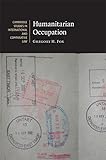Humanitarian occupation / Gregory H. Fox. electronic resource
Material type: TextSeries: Cambridge studies in international and comparative law (Cambridge, England : 1996)Publication details: Cambridge, UK ; New York : Cambridge University Press, 2008.Description: xi, 320 p. ; 23 cmISBN:
TextSeries: Cambridge studies in international and comparative law (Cambridge, England : 1996)Publication details: Cambridge, UK ; New York : Cambridge University Press, 2008.Description: xi, 320 p. ; 23 cmISBN: - 9780521856003 (hardback)
- 0521856000 (hardback)
- 9780521671897 (pbk.)
- 0521671892 (pbk.)
- 341.67 22
- KZ6369 .F69 2008
- 86.80
| Item type | Current library | Collection | Call number | URL | Status | Date due | Barcode | Item holds |
|---|---|---|---|---|---|---|---|---|
 e-book
e-book
|
KNCHR Library SharePoint | Non-Fiction | KZ6369 .F69 2008 (Browse shelf(Opens below)) | Link to resource | Available |
Browsing KNCHR Library shelves, Shelving location: SharePoint, Collection: Non-Fiction Close shelf browser (Hides shelf browser)

|

|

|

|

|

|

|
||
| KZ6148 .T73 2006 Transboundary harm in international law : | KZ6310 .F76 2003eb From Nuremberg to The Hague : | KZ6310 .S35 2008 Building the International Criminal Court / | KZ6369 .F69 2008 Humanitarian occupation / | KZ6369 .O74 2003eb Reading humanitarian intervention : | KZ6374 .F73 2002 Recourse to force | KZ6374 .S78 2007 The threat of force in international law |
Includes bibliographical references and index.
Introduction -- The historical origins of humanitarian occupation I : governance in service of outsiders -- Historical origins of humanitarian occupation II : internationalised territory in the service of insiders -- Full international governance -- Rejected models of statehood -- Constructing the liberal state -- Conventional legal justifications -- The international law of occupation -- Reforming the law : the security council as legislator -- Conclusions. Introduction; Part I. Historical Antecedents: 1. The historical origins of humanitarian occupation I - Governance in Service of Outsiders; 2. Historical origins of humanitarian occupation II - internationalised territory in the service of insiders; 3. Full international governance; Part II. Why Humanitarian Occupation?: 4. Rejected models of statehood; 5. Constructing the liberal state; Part III. Legal Justifications: 6. Conventional legal justifications; 7. The international law of occupation; 8. Reforming the law: the security council as legislator; 9. Conclusion.
This book analyzes a new phenomenon in international law: international organizations assuming the powers of a national government in order to reform political institutions. After reviewing the history of internationalized territories, this book asks two questions about these 'humanitarian occupations'. First, why did they occur? The book argues that the missions were part of a larger trend in international law to maintain existing states and their populations. The only way this could occur in these territories, which had all seen violent internal conflict, was for international administrators to take charge. Second, what is the legal justification for the missions? The book examines each of the existing justifications and finds them wanting. A new foundation is needed, one that takes account of the missions' authorisation by the UN Security Council and their pursuit of goals widely supported in the international community.

There are no comments on this title.